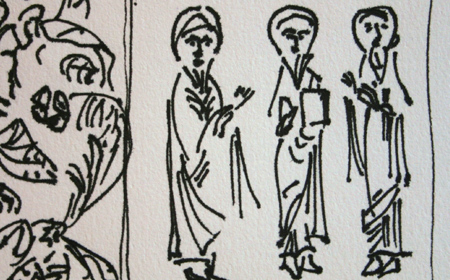Panofsky details a map of
scholasticism and gothic architecture, detailing parallels between the two
including: the rise of Aristotelianism with Acquinas relating to the 'more
lifelike' High Gothic Sculpture of Rheims and other cathedrals; the geographical
'decentralization' of both disciplines after the end phase of the High Scholastic
and High Gothic periods (ca1270); and a general linkage between the dominance
of rational comprehensive analysis of high Scholasticism to the more naturalistic
and less abstract tendency of art in that age
Panofsky: 'Pre-Scholastic
Augustinianism (asserting, among other things, the independence of the will
from the intellect)' in contrast to Thomas Aquinas' Aristotelian inclination
of defining the soul as more of an organizational substance of the body
than existing a priori : a 'return to anti-rational mysticism'
through Eckhart after the phase of High Scholasticism : George
Bernard Shaw, in his discussion of Ibsen:
'the recognition of the will as distinct from the reasoning machinery began
to spread' : periodical waxing
between attitudes of rationalism and mysticism, separation or integration
of will and intellect, if taken as maps, collapsed and irrespective of time,
reflect, rather than critical intellectual leanings during any particular
era, reflections of internal waxing inclinations of the human
spirit
Jung invokes Schopenauer's
statement, contained in the essay that Jung declares stands 'godfather'
to his present writing, "On the Apparent Design in the Fate of the
Individual": ' "simultaneity of the causally unconnected, which
we call 'chance'." ' : Panofsky: 'Both mysticism and nominalism cut the tie between reason and faith
[will and intellect]. But mysticism ... does so in order to save the integrity
of religious sentiment, while nominalism seeks to preserve the integrity
of rational thought and empirical observation ...' : Shaw: 'Schopenauer was the first among the moderns to appreciate the enormous
practical importance of the distinction [between the will and intellect],
...'
Jung:
'The so-called "scientific view of the world" ... can hardly be
anything more than a psychologically biased partial view which misses out
all those by no means unimportant aspects that cannot be grasped statistically.'
: Panofsky: elucidates the
'eternal dilemma of empiricism' which had emerged by the middle of the fourtheeenth
century: that between the intuitus of nominalism, 'notitia
intuitiva', and the intuitus of mysticism, 'notitia abstractiva',:
'all that which is real, ... can never be rational, while all that which
is rational, ... can never be real; so that all metaphysical and theological
problems—including the existence of God, the immortality of the soul,
and ... even causation—can be discussed only in terms of probability.'
: Jung and Panofsky have identified similar shortcomings of empiricism dominant
during different periods
